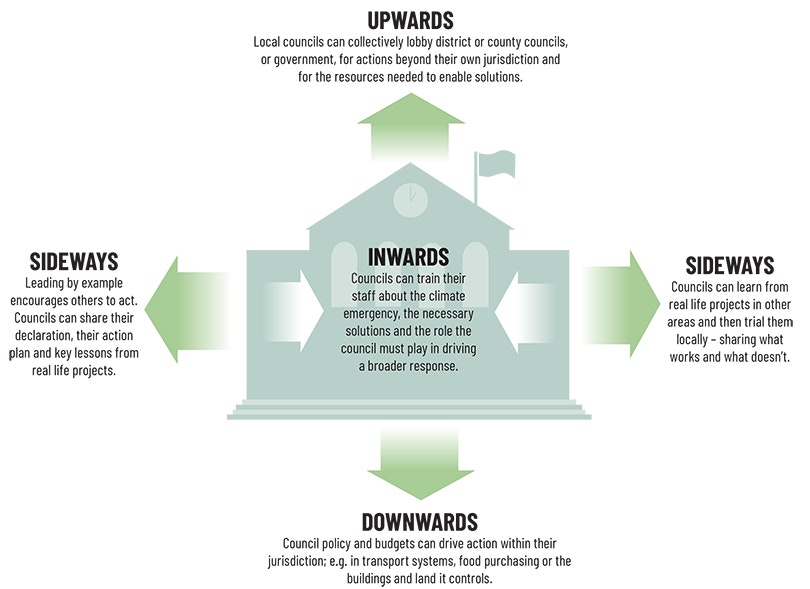Local authorities and communities can be a powerful force for change. Paul Allen looks at how a climate emergency declaration can be transformed into an action plan that supports the transition to net zero.
Published this week, the independent report from the UK Committee on Climate Change ‘Local Authorities and the Sixth Carbon Budget’ makes the clear vital role played by our councils. Local authority action plans represent the ‘locally determined contributions’ to the national net zero target. This is bottom up climate action that meets, or in some cases exceeds, the top-down climate objectives of the UK and devolved governments and results in delivery on the targets.
As well as having to deal with the current pandemic, many local governments clearly recognise they are also at the front line of dealing with climate emergency impacts such as flooding, fires, and storm damage. The majority of UK councils have made climate emergency declarations, and many are now working on climate emergency action plans.
This process is happening on many different scales – in cities such as Edinburgh and Bristol, in large devolved areas such as Manchester and London Metro regions, in rural market towns such as CAT’s home town of Machynlleth, and in villages like Wedmore.
But how do local groups and councils kick-start such projects?
Areas of influence
In our most recent report, Zero Carbon Britain: Rising to the Climate Emergency, we explore how councils can make change happen simultaneously in a number of key directions (see diagram below).

Councils will not be able to reverse global climate breakdown on their own, but by working in these directions they can focus their actions, either on delivering change within their own jurisdiction or putting pressure on national governments to act.
For example, by working ‘sideways’ councils can seek out and build links with relevant actions already underway in other areas. Are other similar town or parish councils further ahead with their action planning process? Are there already existing plans from councils above or below their level?
For every aspect, there are real life case studies that show what can be achieved. Researching and sharing relevant case studies can not only demonstrate locally that change is achievable, and help scale up actions, but also helps avoid mistakes and highlights co-benefits of climate action, such as jobs, cost savings, health benefits and community cohesion.
Another example is that by thinking ‘downwards’ councils can make effective action plans and review existing policies. This means being clear on what any village council, town council or local authority has direct control over, and where the complex and diffuse boundaries of responsibility lie. What changes can it make to the transport systems it runs, to its food purchasing contracts for schools, to the land it controls, to the education system it manages, or to its libraries, arts and cultural venues?
A council can also make its priorities clear when subcontracted tenders are coming up for renewal, for example increasing local benefits and resilience by encouraging bids from social enterprises and local supply chains, as Preston Council has done.
Also thinking downwards, councils need to support the bodies they have responsibility over – for a district council, this could include the development of ‘climate emergency action packs’ to support the parish councils within its boundaries.

Team local
It is also worth councils investing time in identifying and engaging the most relevant local collaborators, such as health boards, universities, industry bodies, experts, non-governmental organisations, funders,
schools, young farmers, think tanks and of course citizen expertise.
The framing of any process to develop an action plan should reflect what is unique or is already happening in your area. It should respect local needs, traditions and culture, linking to important local opportunities such as agriculture, health or local businesses. This helps by linking the action planning to the key issues that are relevant to your locality.
Developing plans will involve a great deal of detailed work, so it may be worth seeking initial kick-start funding for your ‘project team’. But even if there is little initial funding, the current wave of citizen commitment can unleash a great deal of expert volunteer time for your various groups.
Councils taking the lead
A few current examples of emerging climate emergency action plans are outlined below. Some of these are still in the early stages whilst others are more developed, with staff and budgets allocated. They all help illustrate the types of actions that councils can take as they begin to work towards net zero emissions.
South Lakeland District Council
In June 2020, informed by public climate conversations, South Lakeland Council
agreed a plan to help them reach their target of becoming carbon neutral by 2030,
and supporting a county-wide target of 2037.
Measures in their Climate Change Action Plan include:
- Building-by-building reports on external and internal measures, with recommendations;
- Assessing the potential for reducing emissions and improving biodiversity on the land and assets they own;
- Assessing and implementing measures to significantly reduce the council’s travel emissions, including investigating the potential for electric vehicle and bike use for council employees;
- Reviewing procurement to optimise carbon-efficient operations in council contractors;
- Delivering climate change training for all council officers;
- Installing EV charge points and exploring the potential for discounted parking rates for low emission vehicles;
- Facilitating cycle hire provision, including electric bikes;
- Supporting businesses to become low carbon organisations, for example by helping with green audits, hosting workshops and collaborating with companies on community energy groups;
- Helping residents to have more energy efficient homes, including promoting
relevant schemes and offering grants.
Cheshire East Council
Cheshire East’s cabinet have agreed the council’s first Carbon Neutrality Action Plan, which focuses on the initial actions that they will take to deliver their target of the council being carbon neutral by 2025, as well as encouraging and supporting all businesses, residents and organisations within the borough to reduce emissions.
Examples for measures included in their action plan include:
- Reducing business travel;
- Increasing staff engagement and awareness of carbon neutrality;
- Measures to ensure that the carbon neutral ambition has been considered in every major investment and policy decision;
- Reducing energy and fuel use in council operations, such as switching to low-emission vehicles and reducing energy demand from new and existing buildings;
- Plans to improve the supply of green energy by using renewable sources such as solar panels and working to promote renewables with others;
- Opportunities to capture carbon, through tree planting and restoring degraded peatlands.
Carmarthenshire Council
A meeting of Carmarthenshire County Council unanimously resolved that they would commit to making Carmarthenshire County Council a net zero carbon local authority by 2030.
Their plan so far includes:
- Developing a clear plan within 12 months for a route towards being net zero carbon;
- Calling on Welsh and UK Governments to provide the necessary support and resources to enable effective carbon reductions;
- Working with Public Services Board and Swansea Bay City Deal partners to develop exciting opportunities to deliver carbon savings;
- Collaborating with experts from the private sector and NGOs to develop innovative solutions to becoming net zero carbon.
Stroud Council
Stroud District Council has been working on tackling climate change since the 1990s. Now they are not just aiming for the council services to be carbon neutral by 2030, but the whole district.
These are just some of the ways they are meeting the challenge:
- The council have allocated an initial budget and have appointed a dedicated Carbon Neutral 2030 officer to develop opportunities and seek additional project funding. They have already invested in a renewable energy resource assessment and are establishing a Carbon Neutral 2030 Board, with representatives from all sectors.
- Improving transport links to reduce traffic. For example, they are working with Gloucestershire County Council to upgrade key local cycle paths to encourage commuters to switch to walking or cycling.
- Encouraging staff to lift share, use public transport, and walk or cycle to work.
- Their small fleet of vehicles needs replacing, so Stroud are upgrading to more environmentally-friendly options and are considering how to encourage others to use electric vehicles.
- They are working on cutting the carbon footprint of their buildings. Six-hundred district homes have been retrofitted to make them more energy efficient. All new properties with off-road parking are constructed with EV charging points, and renewable energy is actively promoted. The council also plans to replace gas boilers with heat pumps at two of its biggest buildings, including its headquarters, with an estimated annual saving of up to 156 tonnes of carbon dioxide emissions across the two sites.
Opening new conversations
As your council begins to build back better from COVID-19, you can support them in making and delivering climate action plans.
There is growing recognition that the changes needed to get to net zero can also bring a range of other benefits, including: healthier, more resilient local communities; locally generated renewable energy; affordable public transport; cleaner air; more efficient and easy-toheat housing stock; greater employment;
stronger local supply chains; reduced poverty; healthier food; and land systems with more space for biodiversity. Exploring such co-benefits offers the opportunity to engage with wider, more diverse participants.
CAT’s Zero Carbon Britain Hub is offering regular two-day ‘Zero Carbon Britain: Live Online’ training courses plus a range of solutions-focused webinars – click here for details and please get in touch to share your experiences of making a local action plan.
The next article in this series, in the winter edition of Clean Slate, will delve deeper into the detail of how to develop an effective climate emergency action plan.
Find out more
For more information on CAT’s Zero Carbon Britain project, including online courses, events and resources, visit cat.matchstickcreative.co.uk/zcb
About the author
Paul is Knowledge and Outreach Coordinator for CAT’s Zero Carbon Britain Hub. He has led our ground-breaking Zero Carbon Britain research for over 12 years, leading on the development of six reports and liaising directly with government, business, public sector and the arts to share their findings.
- Zero Carbon Britain
- Policy
- News Feed
Related Topics
EMAIL SIGN UP
Keep up to date with all the latest activities, events and online resources by signing up to our emails and following us on social media. And if you'd like to get involved and support our work, we'd love to welcome you as a CAT member.
